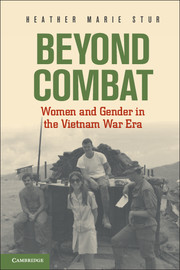Book contents
Conclusion
“You've Come a Long Way…Maybe”: Gender after Vietnam
Published online by Cambridge University Press: 05 June 2012
Summary
Sergeant Whittington and Captain Corley never imagined they would be “firsts.” Both had made careers in the Army, and for the most part, their experiences had been no different from those of their comrades. In 1976, they received promotions – Whittington became conductor of the 14th Army Band, an all-female ensemble, and Corley was named commander of a Women's Army Corps basic training company. Their transitions to positions of authority went relatively smooth; other than Corley getting teased as a “flat-chested WAC,” neither received any trouble from the recruits. In the wake of the Vietnam War, as the Army transitioned to an all-volunteer force, the changes opened up positions for personnel who might have been considered unconventional in the past. That was how Otis Whittington and Larry Corley became the first men to hold their respective jobs.
The Vietnam War and its aftermath coincided with several events that together stimulated changes in gender roles and relations in the United States. The idea of extending equal rights to women echoed the beliefs of antiwar GIs who, along with feminist activists, argued for a gender liberation that would free both women and men from social constrictions. Some vets who had grown up playing John Wayne in neighborhood cowboys-and-Indians games found a new role model in John Lennon, who pulled back from the music scene in the mid-1970s to raise his son, Sean. Veteran Doug Bradley, who was drafted into the Army in 1970 and served as a journalist at U.S. Army Republic of Vietnam (USARV) headquarters in Long Binh, swapped a full-time job for part-time work in the early 1980s so he could stay home and bond with his daughter, Summer. He was part of a neighborhood babysitting co-op in Madison, Wisconsin, and although he was one of few dads in the group, the presence of men as caregivers led one neighborhood boy to remark that Bradley's block was the street where “the dads don't work.” The child's assessment illustrates the gender ambiguities of the immediate post-Vietnam years, when a rejection of militarized gender relations intersected with changes brought by a deindustrializing economy. GI and veteran resistance to the warrior persona at times allied with struggles against racism and sexism on the home front, and economic changes forced more women into the workforce, even those who might have preferred to stay home.
Information
- Type
- Chapter
- Information
- Beyond CombatWomen and Gender in the Vietnam War Era, pp. 215 - 242Publisher: Cambridge University PressPrint publication year: 2011
